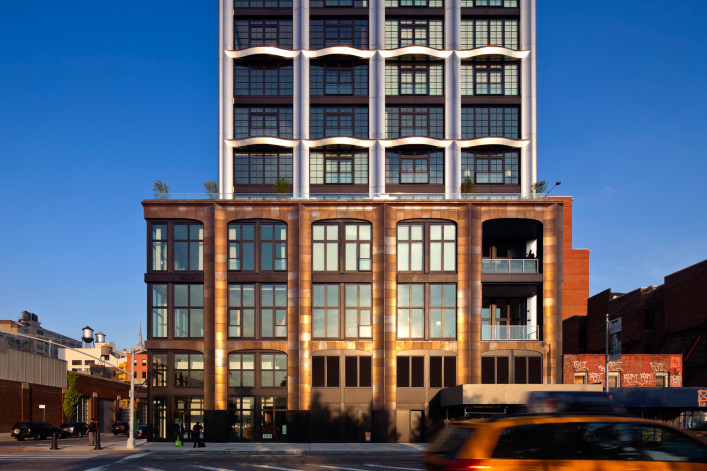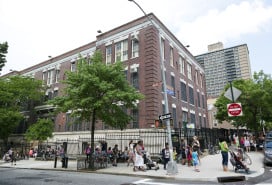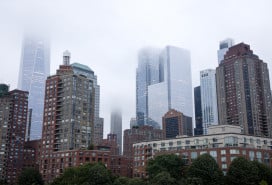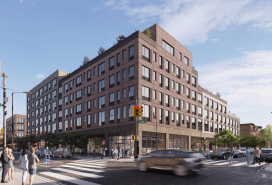Should you buy in a non-union building? And should you care?

The possibility of a doorman strike may be off the table for another four years, so no need to worry anymore, right? Not so fast. As the New York Times reported recently, a growing number of new condo buildings are skipping the union altogether, which may have implications for you as a buyer. (One example, pictured above, is 200 11th Avenue in West Chelsea.)
In fact, it can affect your monthly nut—not to mention the livelihood of the doormen, supers, porters and handymen you rely on everyday. Is it a good idea to invest in a unionized building? Does it matter? Here's the scoop:
Non-union staff is cheaper--or is it?
For the average condo or co-op owner, the biggest difference in union versus non-union labor is the dollar figure on staff wages and benefits—and thus, how much each resident pays every month.
“Non-union buildings generally have lower labor costs than do union buildings,” says Aaron Shmulewitz, a real estate attorney at Belkin Burden Wenig & Goldman.
The Times, citing several unnamed developers, pegged the difference at 40 percent.
The main cost driver is the comprehensive benefits package—including family health insurance and a 401K plan with employer contributions—that are included in the labor contract with SEIU Local 32BJ, which represents 30,000 doormen, supers, handymen and porters across the city.
Hector Figueroa, the president of 32BJ, acknowledges that the cost difference can be “significant.”
Or not.
“A couple of new construction buildings that I have been involved with that have gone union determined that there was not a huge cost differential provided the non-union building was giving comparable salaries and benefits as it would to union employees, which at the end of the day pretty much needs to be done in order to get the same quality of employee," says co-op and condo attorney Robert Braverman of Braverman Greenspun.
A non-union building can go union
If you buy a brand new condo at a non-union building, it won’t necessarily stay that way, since workers can vote to unionize their workplace, and managers cannot fire them for organizing, experts say.
“Many sponsors of new construction condos prefer to start their buildings out as non-union, because the lower monthly labor costs translate into lower monthly carrying charges for the apartments, which keeps monthly costs down for the unsold apartments while the sponsor is still trying to sell them, thus making them somewhat easier to sell, and saving the sponsor money until those units are sold,” Shmulewitz explains.
But a few years later, non-unionized staff could vote to have their building join the union--and many do--boosting condos' operating costs, he says. A savvy attorney will point this out when looking over the developer’s condo offering plan, he adds.
Union or no union, strikes are possible
The last 32BJ strike happened way back in 1991, but owners at union buildings do face the specter of a work stoppage every four years when a new contract is hashed out.
“A union building exposes its residents to potential work stoppages and strikes in the event that labor and management cannot come to terms,” says attorney Terry Oved, who heads up the real estate department at Oved & Oved. “The non-union buildings are insulated from that potentiality.”
On the other hand, just because you live in a non-union building doesn’t mean you’re immune to strikes, Figueroa notes. Non-union workers at two buildings along the High Line—231 10th Avenue and 520 West 23rd Street—held strikes in October to protest what they saw as management’s unfair treatment, and protests have taken place at other buildings in the neighborhood.
Bad apples are easier to get rid of, but the good ones may be hard to come by--or reluctant to stay long
Just like some food shoppers pay more for organic, some homeowners want to invest in union labor if they feel it benefits the workers and the city as a whole. Unions aim to protect workers, ensuring they're treated fairly by management and earn a livable wage.
“We have to remember, these are people,” says union president Figueroa, adding, “This is not like having a new boiler.”
But there’s a selfish reason to choose a union building as well: generally speaking, unionized employees are better, Braverman says, citing anecdotal evidence from property managers. (Although it’s somewhat up for debate, as Shmulewitz notes that buildings are pulling from the same talent pool, regardless of whether workers are 32BJ members or not.)
“When you are dealing with workers that are happier and feel that they are respected and appreciated by management, they are also far more dedicated and involved and engaged and committed to the job,” Figueroa says, noting also that churn tends to be lower. “With a union work force, the first thing that you get is a stable workforce. Turnover tends to be higher in non-union buildings.”
Also, the union offers voluntary classes that train workers in subjects like customer relations, fire safety, and special needs residents. About 3,000 supers have also taken advantage of the Green Supers program, which teaches them to conserve energy, Figueroa says.
On the flip side, it’s difficult to fire an underperforming employee because of “the sometimes byzantine process that is negotiated in the collective bargaining agreement,” Braverman says.
Related posts:
Ask an Expert: How do you fire a super who belongs to the union?
Good news: You have until 2018 to worry about another doorman strike
What you'll live without if 30,000 building staffers go on strike
Can I get a break on rent if there's a doorman strike?


























